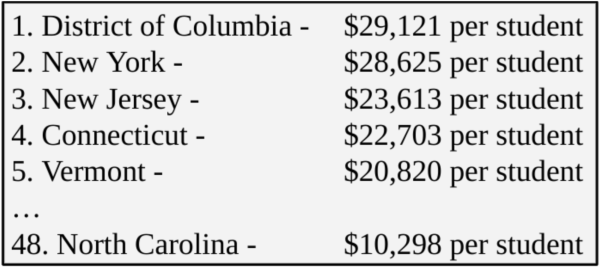On the first day of 2025, many North Carolinians celebrated the new year with resolutions and a fresh start, and one start comes with a new State Superintendent for North Carolina Public Schools (NCDPI). Maurice “Mo” Green was inducted into the State Superintendent position for state public schools in January. During his campaign, he shared ambitious goals to improve North Carolina’s public education. Now that he officially holds the position, he shared what he will do to best enact his plans and reach these goals, aiming to improve education for all North Carolinian students.
The GH Falcon had the opportunity to discuss some of Green’s current work and future plans. In a description of his campaign process, he walked through what he wanted to accomplish and some ways in which he started to work toward these goals. “As part of the campaign I shared a vision for public education for the state of North Carolina. I like to call it ‘achieving education excellence’, which is this combination, or what I call coupling, of academic achievement, character development and also the sense of striving for excellence,” he said.
He reinforced his strong statement on improvement in the school systems and also stated, “I have been unafraid to say that we all should be trying to be the best school system in our entire country. That is the goal that I have been following in the campaign.” While it is a powerful statement and will require hard work to follow up on, Green believed that through collaboration with his staff, this goal can be achieved.
Green shares platform pillars and essential issues
While Green discussed his overall goal during the campaign, he divided his vision into specific pillars of focus. “We certainly need to have full funding from the education system, revering of our educators, preparation of our students for whatever is next for them, enhancements to our engagement with parents and community, ensurance of a safe and secure learning environment for all of our students and staff, and celebration of the good of public education,” he said, giving an overview of his mission. Overall, Green presented a list of key points he wanted to focus on.

Green discussed the areas that he believed were the most important and should be focused on during his term. At the top of the list was school funding, which he discussed in more detail: “The national average is around $16,000 for each student. Virginia to our north and South Carolina to our south provide about $14,000 to $15,000 while North Carolina provides around $11,000. So you can begin to see a pretty dramatic difference between us nationally and the states around us. We’re actually 48th in the country compared to other states.” He attributed this to a lack of effort rather than resource availability, and resolved to increase funding for students.
When asked how he would access additional resources and funding, he explained that working directly with legislators, regardless of their political platform, was the best way to acheive this goal. “It is something that I plan to work on and recognize and convince policymakers to appropriate funding for our public schools. I’m not trying to put folks on the defensive but just trying to have a conversation and listen to what’s important to them and what would be helpful for them to consider providing additional funding for our schools.” Green also plans to increase public school funding through peaceful and diplomatic discussions with those across the political spectrum.
Another major point of concern in Green’s mind is the treatment of educators throughout the public school systems of North Carolina. He has strong beliefs about increasing visibility and compensation for teachers, which he outlined. “I would increase educators’ compensation level, and it’s connected to the respect that we show to our educators. I work to revere our educators. I think on a national level and certainly here in North Carolina, there’s been a lot of negativity put towards and around our educators, and I’m trying to help change the way folks talk about them.”
Further, Green is working to eliminate any negative image that has been created about educators and instead wants to respect and credit them for the work they do. To do this, he has a simple yet effective plan: “I’ll be utilizing folks to help me figure out how to communicate with folks in ways that’ll perhaps help them share the amazing work that our educators do.” Plain and simple, Green will highlight the work that educators are doing by publicly sharing their efforts.
The final issue that was on the top of Green’s list was student achievement. He discussed some areas where students were thriving, but some other places where there was clear room for improvement. Not only does he want to close performance gaps between students, but he also wants to recognize where students are already succeeding.“We’ll celebrate those things that we’re doing well at, like graduation rates, we’ll celebrate where we’re increasingly seeing students taking and passing college-level courses while still in high school, but if you look at other matters, there’s room for some improvements.” Discussing both the bad and the good, he plans to bolster performance by both improving some weaker areas and encouraging students in the stronger ones.
Pre-inaguaration preparation
While Green identified issues that were his priority, he also shared the preparation he has been doing to prepare for his term. “The way that I like to operate when I go into any leadership position is to ultimately develop what I call an entry plan that will outline the work that I will do as I enter the job. That will lead us ultimately to the development and then implementation of a strategic plan. Along with that, I have certainly explored what the organizational structure of the leadership team at the Department of Public Instruction will look like.” Just scouting out the structure of his new position, Green explained that he has already created a way to smoothly and effectively move into this position, getting as much work done as possible.
Green talked about the leadership team in the North Carolina Department of Public Instruction (NCDPI), focusing on what he would like to do with this team to best improve it. He talked about new changes to the team, explaining, “There is a full leadership team of about four dozen, and I’m trying to be sure that I understand what the current structure looks like and thinking about what a new structure might look like when I take over.” He also discussed a recent announcement stating that there would be a new organizational structure. “[The new structure] actually then has allowed us to indicate that there are several positions that are open for folks to apply for and be considered for and potentially be hired for.” With changes to the organization, new hires and structural reconfiguring, Green is sure to create a leadership team that best works to achieve his goals.
Green knew that he alone couldn’t know everything that needed to be done with public education, so he also created a plan to learn about issues that may have slipped under his radar. “I’ve had lots of conversations with lots of folks across the state to learn more about what their interests are and what they’re hoping for in this new administration,” he stated. Green worked to get several opinions to best locate issues and work to fix them in the school systems or public instruction administration.

Going even further into hearing other people’s opinions, he discussed a method that he created called “Mo Wants To Know.” He talked about the implementation of this method, intending to hear feedback from teachers and students. “It’s a bit of a brand that started at Guilford County Schools and continued in my other roles. It’s called ‘Mo Wants To Know,’ which is an opportunity to ask questions and listen and learn and then utilize feedback to put together a strategic plan that will guide the work of the Department of Public Instruction, and all of the school districts, charter schools and all the other schools that the district supports.”
Green pays homage to his background in education
Moving beyond the policies and goals that Green is planning to enact during his term, Mo sharedhis background and what led him to run for this position in the first place. He discussed this career change, among other shifts throughout the last few decades. “I was given the opportunity probably 20 or so years ago to become the general counsel for Charlotte-Mecklenburg Board of Education, so my background is not actually directly in education, I was an attorney, and I represented lots of clients. I also got to represent individuals, and also the school district. I found that I enjoyed representing school systems.” Originally planning to be a lawyer for his whole career, he was introduced to the education world after representing school systems, which led him down the path that led him to where he is today.
After working as an attorney and second in command for the superintendent at the Charlotte-Mecklenburg school district, Green retired. After some time, he came out of retirement, a process which he described: “There were issues that were concerning to me, including the tax bearer funding voucher program, but it took a call from Governor Roy Cooper and a conversation with him that convinced me to step into this race. I thought that if I do so, maybe we can really elevate our public schools here in the state of North Carolina to being the very best in the country.” Green knew his work with education wasn’t finished, so he came back to work, fighting for what he thought was best for public schooling.
Mo Green has enormous goals for his term that started on Jan. 1, and he has at least a four-year term to enact his plans to better the school districts in North Carolina, boosting academic achievement and the learning environments that produce leaders of the next generation.















































































